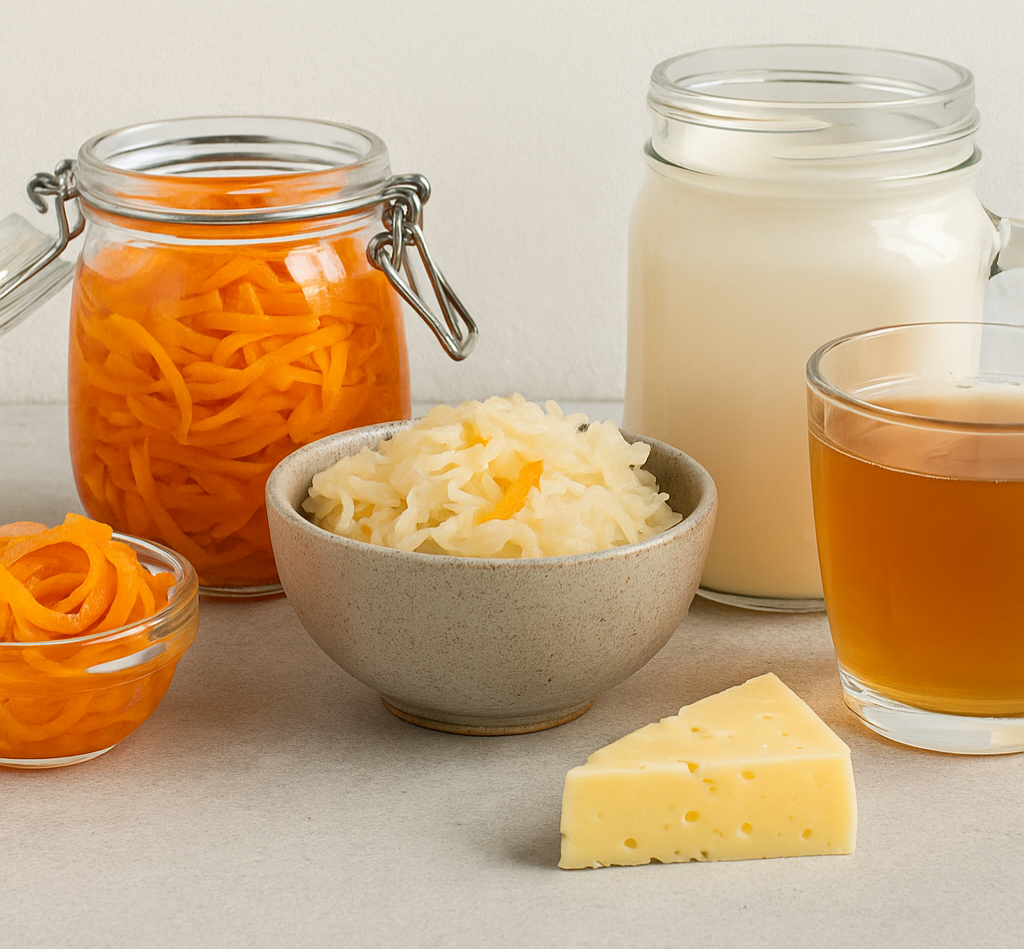You’ve probably heard that sauerkraut, kefir, or kombucha are “good for your health,” that they “contain probiotics,” or that they “help your gut.” But… what does all that actually mean? Today I’ll explain—simply and clearly—why fermented foods are so valuable for your body and well-being.
Let’s Start with the Basics: What Is a Ferment?
A ferment is a food that’s been transformed by beneficial microorganisms, like bacteria, yeasts, or molds. These microbes feed on the natural sugars in the food (like lactose in milk or glucose in fruits) and turn it into something new: more acidic, more complex, and often more nutritious.
Common examples:
- Yogurt, kefir, cheese (dairy ferments)
- Sauerkraut, kimchi, brined vegetables (vegetable ferments)
- Kombucha, ginger beer, kvass (fermented drinks)
- Sourdough bread (fermented with wild yeast)
What Are Probiotics?
Probiotics are live microorganisms that, when consumed in adequate amounts, provide health benefits, especially for your digestive system.
In short: some ferments contain live probiotics. And those tiny allies are powerful.
What Are the Benefits of Fermented Foods?
Here are some of the most important ones (and yes, science backs them up!):
1. 🌿 They Improve Digestion
Good bacteria help break down food, which can ease issues like bloating, gas, or sluggish digestion.
2. 🧠 They Strengthen the Immune System
A large part of your immune system lives in your gut. A balanced microbiome (i.e. plenty of good bacteria) helps defend your body against harmful pathogens.
3. 😌 They Support Your Mood
The gut is connected to the brain—some even call it the “second brain.” A healthy microbiota can positively influence your mood and reduce stress or anxiety.
4. 💪 They Boost Nutrient Absorption
Fermentation can increase the bioavailability of nutrients like B vitamins, vitamin K2, and certain minerals.
5. ❌ They Reduce Antinutrients
In some plant-based foods, like legumes or grains, fermentation helps break down compounds that block nutrient absorption (like phytic acid).
Do All Fermented Foods Contain Probiotics?
Not always. Only live, unpasteurized ferments retain their probiotics. For example:
- Yogurt that has been pasteurized after fermenting… no longer has live cultures.
- Store-bought sauerkraut in vinegar… isn’t fermented or probiotic.
That’s why homemade or artisanal ferments are ideal—they haven’t been heated or preserved artificially.
Can I Eat Fermented Foods Every Day?
Absolutely! But it’s best to start slowly, especially if your gut isn’t used to them. A spoonful of sauerkraut a day or a small glass of kefir is enough to start feeling the benefits. From there, you can mix and match different ferments.
In Summary…
Fermented foods are more than a trend: they’re a time-honored tradition that offers flavor, health, and microbial diversity. Adding them to your diet is a delicious, natural way to care for your body from the inside out.
